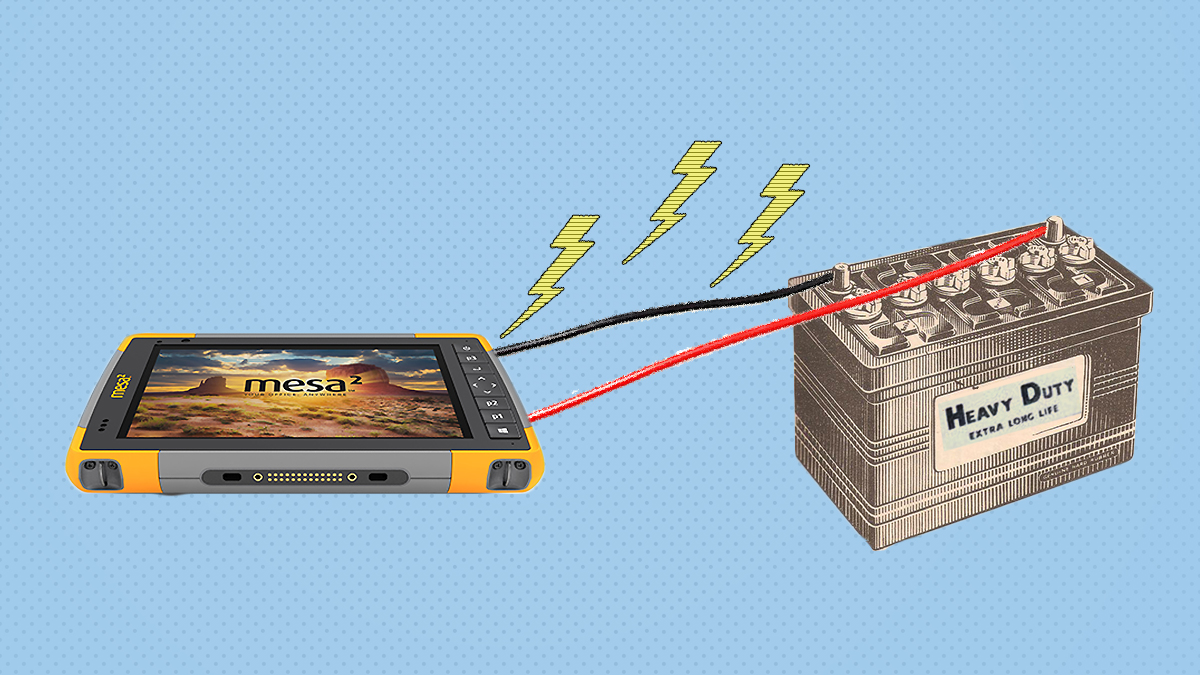
Juniper Systems electronics engineering manager Eldon Peterson answers some of your burning questions about, yes, phone and mobile device batteries. Hold on tight.

1. Why do cell phones and other electronics die in cold weather?
Some modern mobile devices die with a full charge or slow to a crawl in the cold because the chemical composition of the battery gets less mobile in low temperatures. Like water turning a water wheel, once the water is frozen the wheel stops turning.
Inside each battery there is an electrolyte, which is the solid or liquid chemical composition that stores energy. If the chemical reaction inside the battery slows enough due to the cold, a device – even one with a full charge – might die as the battery struggles to send a constant charge out of its system.
Juniper Systems’ rugged handheld computers and tablets use battery cells with a chemical composition designed to perform at low temperatures. The Mesa 2 Rugged Tablet is rated to operate in -4 degrees Fahrenheit.

2. Is leaving my cell phone on the charger bad for the battery?
Here’s the short answer: Leaving a device plugged into a charger shouldn’t be bad for the battery. While overcharging is bad for a battery, reasonably smart products are designed to protect the battery.
Most well-designed modern mobile devices can quickly shift the flow of electricity away from the battery once it’s fully charged. The electricity should then run the device from the external power source and leave the battery alone with its full charge.
Juniper Systems’ products are designed this way to protect the battery and extend each product’s life.
 3. Should I let my cell phone battery fully discharge?
3. Should I let my cell phone battery fully discharge?
Like running out of gas in a car, it happens – but it’s not great for the device. Most modern phones and mobile devices use lithium-ion or lithium-polymer batteries that are more resilient than past batteries. However, a full discharge shortens the overall life of a battery.
Lithium-based batteries will have a longer useful life if users begin to recharge them before their device dies or reaches extremely low charge levels. Juniper Systems current line of rugged devices use lithium-ion batteries.

4. Why do cell phone batteries die after time?
The chemical movement that occurs when you charge and discharge a battery eventually wears out.
Inside a battery’s chemical composition things crack, break, and weaken after a number of full charges and discharges. Each full charge and discharge is called a battery cycle. Eventually, the battery irreversibly breaks down, like a trampoline spring getting stretched out.
Juniper Systems’ rugged devices are optimized for hundreds of battery cycles, extending the life of each device by several years.

5. What can I do to protect my cell phone’s battery?
To maintain a healthy battery, keep it out of the heat. A hot battery quickly wears down and heat increases the chances of a malfunction. Charging a battery in the heat can cause additional damage.
Fast chargers increase battery wear and can shorten its useful life – even fast chargers sold by the device manufacturer.
Juniper Systems products are designed to work in high-temperature environments. The Mesa 2 Rugged Tablet is rated to operate in 122 degrees Fahrenheit.

6. What is the battery ‘memory effect’?
Early batteries suffered from a problem dubbed the memory effect. If a battery wasn’t entirely discharged between charge cycles, the battery might experience reduced capacity when charged again. This apparent capacity loss made it appear as though batteries were wearing out prematurely. While there were ways of recovering from the memory effect, it made battery management difficult.
Modern lithium-based batteries used in most electronics don’t suffer from the memory effect.

7. What popular batteries have been used in cell phones and mobile devices?
Lithium-ion batteries are rechargeable and composed of lithium compounds capable of accepting and releasing lithium ions. These batteries are highly energy dense, lightweight and – while more volatile than most non-lithium batteries – are some of the most popular types of rechargeable batteries in cell phones and tablets. Lithium-ion battery technology is fairly mature; however, battery manufacturers continue to make subtle improvements, especially to battery safety.
Lithium-ion polymer batteries are rechargeable and made of lithium compounds using a semi-solid gel polymer electrolyte instead of liquid electrolyte. These batteries are used frequently in applications that require light-weight, flexible batteries with high energy densities.
Lithium-ion polymer batteries often come in a hand warmer-like pouch format. These batteries are affected by over-discharge, high temperatures, and are susceptible to penetration like their lithium-ion counterparts. In addition, lithium-ion polymer batteries struggle to perform in cold environments.
Nickle metal hydride is a type of rechargeable battery briefly popular in mobile devices between the mid-90s and early 2000s – a period after the long reign of nickel-cadmium batteries and before lithium-based batteries. These batteries had a greater energy density than older nickel-cadmium batteries and had fewer issues with the memory effect.
Nickel-cadmium is a type of rechargeable battery used in early mobile electronics. Nickel-cadmium batteries were fairly energy dense for the time and performed well in low temperatures, but they suffered from the memory effect.
Comment below other questions you might have about mobile device batteries and subscribe to the Get Rugged blog by Juniper Systems for more helpful information about rugged mobile computers and handheld technology. To learn more about Juniper Systems products, contact us here. Or, visit us online.

